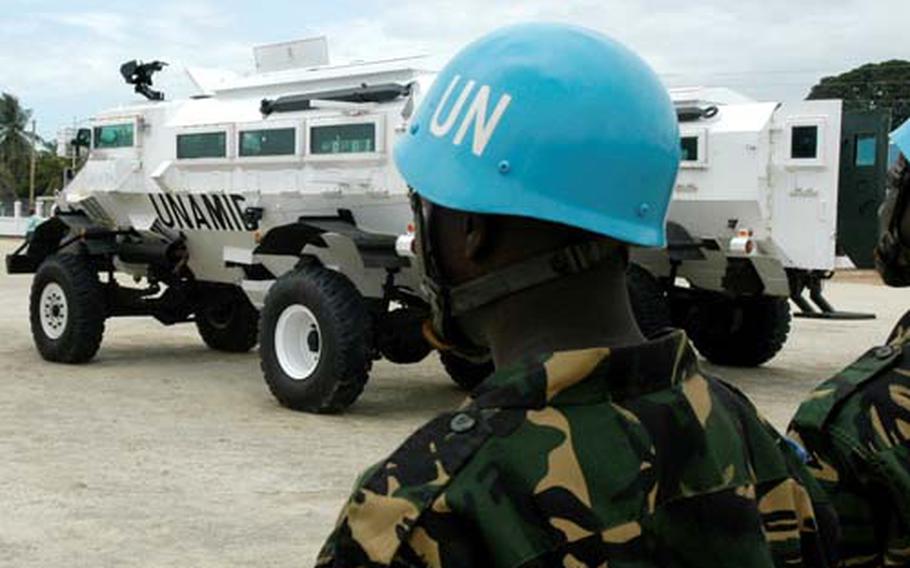
A battalion of Tanzanian soldiers will deploy to Darfur in the coming months as part of the U.N. and African Union peacekeeping effort there. The troops will depart with equipment and vehicles supplied through the African Contingency Operations Training and Assistance program, a U.S. State Department initiative. (John Vandiver / Stars and Stripes)
DAR ES SALAAM, Tanzania — Defense forces here received military equipment and supplies this week that will assist a battalion of Tanzanian troops during an upcoming peacekeeping mission in war-torn Darfur.
Some $9 million in heavy- and light-armored vehicles and other supplies were provided by the United States and Great Britain through the African Contingency Operations Training and Assistance program. The equipment transfer, a State Department-led initiative, was made during a pomp-filled ceremony Tuesday at Tanzania’s military headquarters.
The donations were the result, in part, of the country’s partnership with U.S. Africa Command, which has established numerous training initiatives in the past couple years with the east African nation of 39 million.
Gen. William "Kip" Ward, commander of AFRICOM, was in Tanzania for the ceremony and a round of meetings with the country’s military leadership.
"Tanzania Battalion One is deploying because it was properly trained and evaluated to be ready to conduct the important mission at hand," Ward said during a speech before the assembled crowd of soldiers and dignitaries. "I believe it is through partnerships like this that we can and will succeed in achieving our mutual goals of bringing peace and security."
During meetings with Tanzanian officials, there was a recurring theme of promoting peace through enhanced military capacity.
During Ward’s repeated trips to the continent, he hammers home a familiar AFRICOM message: Help countries, through training partnerships, increase their ability to provide for their own security.
Nonetheless, many of the questions Ward fields during these tours stretch way beyond AFRICOM’s stated objective of establishing military-to-military training partnerships.
Frequent questions include: What is the U.S. doing about the problems in Darfur? What can the U.S. do about the unrest in Somalia? What about piracy? And the most common question: Will AFRICOM relocate its headquarters to the continent at some point?
The command has been based in Stuttgart, Germany, since it was stood up in October. Military officials had discussed basing operations in Africa, but resistance from governments there prompted the decision to remain in Stuttgart.
During a news conference with local African media following the equipment transfer in Tanzania, the headquarters issue popped up once again. In fact, there was a rumor afoot that AFRICOM was looking to set up shop in Tanzania.
Ward’s response: "The answer is no. We are not planning to establish a military base in Tanzania. We have never had that as an intention. I have not asked any government in Africa (to play host). And I have no intention of doing so."
Whether that puts the rumors to rest remains to be seen, but during Ward’s meeting with Tanzanian defense officials, the focus was on Tanzania’s upcoming mission to Darfur and its growing partnership with AFRICOM.
"If we do anything at all, we want to do things that make a difference to you," Ward said during a meeting with defense leaders.
During his current tour of Africa, Ward is spending time in the countries of Tanzania, Mozambique and Swaziland for meetings with military and political officials.
Shortly before arriving, Ward reflected on the challenges posed around the continent, where the needs are as varied as the languages and traditions.
"Many people think it’s a single country," Ward said. "Each is different. Each is diverse."
"Success isn’t measured in hours, days, months. It’s measured in many respects, in years. These things take time," Ward said.
The complexity of the continent means there’s no cookie-cutter approach when it comes to building military programs with partner countries.
In the case of Tanzania, there is a professional military in place and one of the most stable governments in the region. The military here has been carving a niche for itself as a player in humanitarian and peacekeeping efforts in the greater region.
"One thing that stands out is the commitment by government to do things in places like Darfur," said Col. John Ruffing, AFRICOM’s chief for military programs in the south and eastern regions. When it comes to providing equipment, "one of the things the U.S. government looks for is the will to do things around the continent."
Much of the recent focus in Tanzania has centered on senior and mid-level officer training opportunities, which can add strategic perspective, according to Ruffing.
Furthermore, carving out niches could be an effective way for militaries to make contributions toward broader security. It doesn’t only have to be all about infantry fighting or peacekeeping deployments, Ruffing said.
For instance, in the case of Mozambique, the military has expertise in mine-clearing, a skill in demand in Kenya.
A partnership "would be beneficial for both," Ruffing said.
Another place that has been making big gains is Rwanda, where just 15 years ago a massive genocide was tearing at the country. But in recent years, Rwanda has developed one of the more professional militaries in the region.
During a recent visit to Rwanda, AFRICOM officials were struck by the progress.
"Everything they’ve learned they’ve come back and trained other folks on," Ruffing said.
During the equipment exchange ceremony in Dar es Salaam, which included representatives from the U.S. Embassy and officials from Great Britain, the Tanzanian troops demonstrated their soldiering skills as they moved in formation.
Amid the ceremonial pageantry, Tanzanian defense leaders talked about what these partnerships bring.
"It has contributed immensely to building our capacity to support peacekeeping operations," Tanzanian Defense Minister Hussein Mwinyi said.